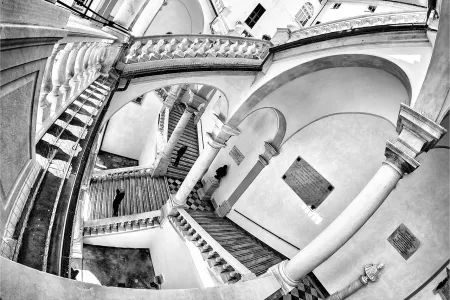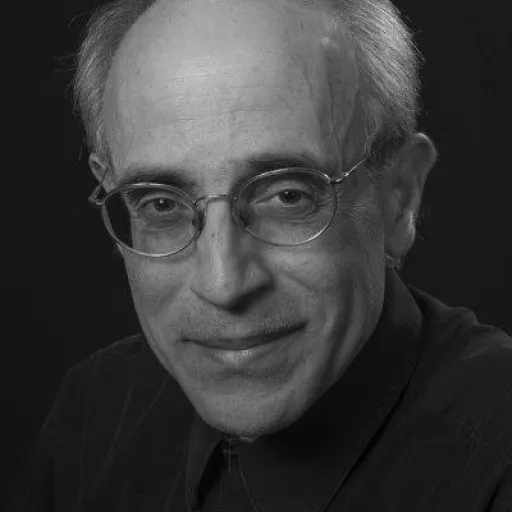The Glass Bead Game
From "Design Discourse"

Interdisciplinary cross-pollination allows new ideas to flower, both in the academy and the market, as illustrated by Sir Francis Bacon's fable in the Novum Organon (1620). Playing entomologist, Bacon divides knowledge workers into three kinds of insects. Ants blindly collect and use facts; spiders spin webs of sophistry from their ass; but bees gather material from the flowers of the garden and field, then transforms and digests it by an internal process.
“And the true business of philosophy is much the same,” Bacon concludes, “for it does not rely chiefly on powers of the mind, nor does it store the material supplied by natural history and practical experiments untouched by memory, but lays it up in the understanding changed and refined." Distilled and circulated, the nectar of knowledge creates the honeycomb of Adam Smith’s Great Society. In the resulting buzz of the marketplace, citizens “must practice oratory” their entire lives, Smith maintained, trading words and expertise as well as goods and services to promote their individual good, and the general welfare of the hive.
THE TRUE BUSINESS OF PHILOSOPHY
Given this social reality, shouldn’t the academy teach students to become effective and ethical rhetors in an emerging knowledge economy, particularly when globalization and technology have brought our planet to a historic turning point? Until recently, the liberal arts have ducked this question as matter of principle, supposedly because techno-capitalism is inherently dehumanizing and because humanists should dissuade students from seeking professional training. Matthew Arnold, the apostle of the Great Tradition, took a similar position in his famous debate with Thomas Huxley, who called for a “practical” liberal education at a time when science and industry had dramatically increased access to public schooling in Victorian England. Even so, Arnold conceded a major point:
[The traditional liberal arts] show the influence of a primitive and obsolete order of things, when the warrior caste and the priestly caste were alone in honor, and the humble work of the world was done by slaves. We have now changed all that; the modern majesty consists of work, as Emerson declares; and in work, we may add, principally of such plain and dusty kind as the work of cultivators of the ground, handicraftsmen, men of trade and business, men of the working professions. Above all is this true in a great industrious community such as that of the United States.
Plato’s Academy is not fit for our world, Arnold admitted, because Plato, who scorned handicraft and the professions, never could have foreseen a capitalist society. “Such a community must and will shape its education to suit its own needs,” Arnold said. “If the usual education handed down to it from the past does not suit it, it will certainly before long drop this and try another.”
Like Dr. Arnold, contemporary advocates of the liberal arts should be gracious and perceptive enough to see consumer demand for professional training in higher education as an expression of mass democracy, and an equally valid form of humanism. As Fr. Walter Ong pointed out in his 1978 MLA President’s Address, markets and technologies increasingly attract college students, “not because they are inhuman, but because they are eminently human, the creations of human beings.” Like language itself, they are media of exchange and as such deserve scholarly respect and attention. As their very title implies, professors are professionals, too, Ong reminded his fellow scholars, with “fiducial” responsibilities to their institutions and clientele.
HUMANISM AND THE PROFESSIONS
Richard Freeland agrees. “Claims for the moral superiority of liberal education reflect a bias against—even a disdain for—the workaday earning experiences of most adults,” he states, “as if academic learning had a monopoly on value and meaning and other forms of work were solely about material gain. This perspective is an unfortunate relic from the tradition of classical—and class-based—education in Britain, from which the contemporary liberal arts are descended.” Following the counter-tradition of Bacon, Smith, and Huxley, Freeland argues that professionalism and humanism, with the proper education and under the right conditions, can and should be synonymous:
Instead of deriding students’ interest in their careers, we should help them see how the work they do can promote personal growth, intellectual adventure, social purpose, and moral development. We should show them how the values of intellectual honesty, personal integrity, and tolerance can strengthen the institutions in which they will work. And we should help them build bridges between the intellectual concerns they encounter in philosophy, literature, and history courses and the decisions they will have to make as business leaders, lawyers, and government officials. Properly conceived, practice-oriented education can provide at least as powerful a moral education as any purely academic study of ethics.
Whether these benefits ultimately outweigh potential drawbacks depends on vision, wisdom, and action. As globalization drags the liberal arts, kicking and screaming, from the cloister to the market, PTW programs can prepare the academy to face its greatest contemporary challenge. With compelling urgency, Peter Drucker describes the stakes:
"The knowledge society must have at its core the concept of the educated person. It will have to be a universal concept, precisely because the knowledge society is a society of knowledges and because it is global—in its money, its economics, its careers, its technology, its central issues, and above all, in its information. Post-capitalist society requires a unifying force. It requires a leadership group, which can focus local, particular, separate traditions into a common and shared commitment to values, a common concept of excellence, and on mutual respect."
FOOL'S GOLD AND REAL GOLD
The interminable debates between theorists and humanists, therefore, are a dead end. Global society needs the very thing deconstructionists and other radical skeptics reject: a universally educated person. At the same time, the great Western tradition, which humanists defend, is inadequate for a postcolonial world. Humanists can offer only a bridge to the past, when students need to bring their knowledge to bear on the present with the hope of shaping the future. Without that practical application, Drucker states, humanism remains “dusty antiquarianism.”
Herman Hesse foresaw this educational crisis in The Glass Bead Game (1943). Set in an isolated utopia of artists and intellectuals, the novel follows the scholarly career of the precocious but callow Joseph Knecht. Enrolled in the Academy of Castalia, he learns to perpetuate all human knowledge through the study, teaching, and playing of the cryptic Glass Bead Game, a cross between the Kabbalah and Trivial Pursuit. Eventually, young Knecht becomes Magister Ludi, the Master of the Game, but his administrative duties force him to deal with an outside world of carburetors and butcher bills. Initially, this contact shocks and depresses Knecht, who writes memos and reports to maintain the Academy. What do dirty politics and sordid commerce have to do with Castalia’s pristine erudition? But as his interactions with the outside world continue, Knecht becomes disillusioned with the Academy’s remoteness and aridity. The Glass Bead Game seems increasingly empty and pointless. Troubled, he feels called to bridge the two worlds, the academic and commercial, by tutoring the son of an apostate former schoolmate, Plinio Designori, who has fled Castalia to become an entrepreneur and a man of affairs. In the end, the Magister chooses “polluted, vulgar, turbulent, strife-torn, money-grubbing reality.” Ultimately, despite Knecht’s untimely death in a drowning accident, this brave decision, Hesse predicts, will make the outside world a better place.
Hesse’s allegory warns about the dangers of segregating the disciplines from the professions. Writing in exile during World War Two, he saw how Von Humboldt’s model of the pure research university was bankrupt, how the German academy’s finicky refusal to deal with the mess of markets and technologies had paved the way for disaster. Martin Heidegger’s hatred of capitalism, for instance, led him to embrace mystical fascism. But Hesse also suggests the proper function of the liberal arts in today’s knowledge society, at a time when a clash of cultures again threatens to plunge our planet into war. As Peter Drucker observes, the humanist values of Castalia are “only fool’s gold unless they have relevance to the world.” Professional and technical writers have known this truth since Agricola. Real gold must be mined, smelted, and coined, and PTW programs can provide colleges with the practical and intellectual tools and techniques to forge a new humanism suitable for the perils and promises of a new century.
